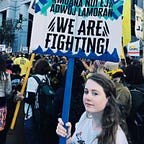No, Plastic Production Isn’t ‘Essential.’ It’s Dangerous.
Letter to leaders urges rejection of petrochemical industry’s COVID-19 exemption
We’re part of a national coalition working to stop the fossil fuel industry from dramatically ramping up plastic production in the United States, which threatens communities, oceans and our climate. The industry’s aggressive plan to convert fracked gas into mountains of throwaway plastic packaging is a serious public-health threat that will far outlast the current COVID-19 crisis.
Our message is simple: Protect our air and water, stop making plastic.
When the petrochemical industry recently sought waivers from national stay-at-home orders designed to slow the spread of coronavirus, we were outraged. So we wrote, circulated and submitted this letter, from more than 30 organizations that are fighting dozens of proposed plastic plants around the country:
March 24, 2020
Dear President Trump and United States Governors,
On behalf of the undersigned organizations, we write to ask that you deny the petition for special treatment submitted by the American Chemistry Council on behalf of the petrochemical industry. It is simply wrong to give a blanket exception to industry from protective measures designed to keep workers and communities safe from the spread of the coronavirus.
Coronavirus poses an unprecedented challenge to public health. Everyday businesses, services, community centers, and schools across the nation are closing to safeguard public health. The federal government and the Centers for Disease Control and Prevention have advised Americans to avoid gatherings of larger than 10 people, to cease unnecessary travel, and to implement social distancing.
Petrochemical manufacturing and related construction projects should not be the exception to the guidelines put forward by federal, state and local governments. All sectors of our economy must play a responsible role in stopping the spread of this highly contagious coronavirus. Exceptions should be considered on an individual basis and narrowly limited to essential needs for responding to this public health crisis. Our nation must put the safety of communities, workers, and the environment at the forefront of our response.
While there are certainly specific products that are critically important in the fight against the coronavirus, to grant a request for a blanket exception for an entire industry to continue to operate massive, broad-ranging chemical and plastic manufacturing complexes would pose an unreasonable risk to public health.
Thousands of petrochemical industry workers are continuing to travel to and gather at worksites, work in teams, and share equipment and common areas. Petrochemical construction workers have reported health hazards at petrochemical construction sites, including unsanitary conditions and overcrowded buses. They cannot effectively practice social distancing. It is not responsible to continue to put workers at high risk of contracting and spreading coronavirus. Just this week, a worker from a Baton Rouge chemical plant tested positive for coronavirus, but the industry refuses to implement closures like we have seen in auto manufacturing.
In addition to the health of workers and their communities, the financial security of their families during this time is also essential. It is imperative that industry workers be made whole, including paid leave and health benefits for all affected workers and their families.
Petrochemical facilities are inherently dangerous. The pandemic has severely compromised the ability of state and federal regulators to provide sufficient oversight and enforcement of safety and environmental laws. Now, it is asking for a wide-ranging exemption to continue to operate business-as-usual without appropriate oversight and while others make needed adjustments.
We urge you to refuse this request and instead consider the immense public health and safety risks of allowing the entire petrochemical industry to operate business-as-usual operations during this pandemic. Any exception must be narrowly tailored for public health and safety purposes.
Thank you for your consideration.
Sincerely,
Miyoko Sakashita
Oceans Program Director
Center for Biological DiversityVeronica Coptis
Executive Director
Center for Coalfield JusticeLogan Welde
Director of Legislative Affairs
Clean Air CouncilLynn Thorp
National Campaigns Director
Clean Water Action, Clean Water FundGail Murray
Spokesperson
Communities First Sewickley ValleyBev Reev
Organizer
Concerned Ohio River ResidentsLeann Leiter
Ohio & Pennsylvania Field Advocate
EarthworksDoug Couchon
Co-founder
Elmirans and Friends Against Fracking, People for a Healthy EnvironmentDr. Ann Blake
Environmental & Public Health ConsultingAlison Grass
Research Director
Food & Water ActionBrook Lenker
Executive Director
FracTracker AllianceLeatra Harper
Managing Director
FreshWater Accountability ProjectCharlie Cray
Political and Business Strategist
GreenpeaceClaire Barnett
Executive Director
Healthy Schools NetworkIsabella Zizi
Member
Idle No More SF BayMike Stout
President
Izaak Walton League of America — Allegheny County ChapterAmy Ziff
Executive Director
MADE SAFE & Nontoxic CertifiedJim Vallette
President
Material Research L3CAshley Funk
Deputy Director
Mountain Watershed AssociationJuan Parras
Director
Texas Environmental Justice Advocacy Services (T.e.j.a.s.)Vivian Stockman
Executive Director
Ohio Valley Environmental Coalition (OVEC)Stephanie Ulmer
PCATJacquelyn Bonomo
President
PennFutureTricia Cortez
Executive Director
Rio Grande International Study CenterAlison Steele
Executive Director
Southwest Pennsylvania Environmental Health ProjectChristopher Chin
Executive Director
The Center for Oceanic Awareness, Research, and Education (COARE)Kelsey McNaul
Regional Organizer
The Climate Reality ProjectJackie Nunez
Founder
The Last Plastic StrawSam Pearse
Lead Campaigner
The Story of Stuff ProjectChris DiGiulio
Co-founder
Upper Uwchlan Residents for SafetyHeather Trim
Executive Director
Zero Waste Washington
